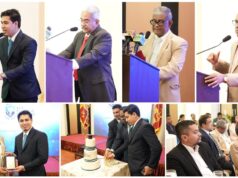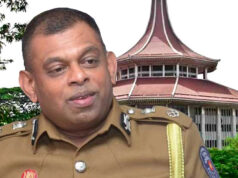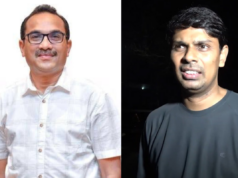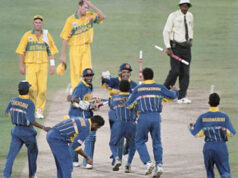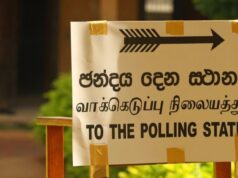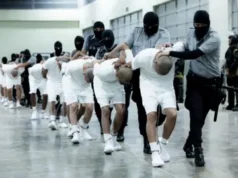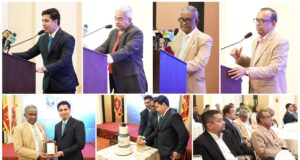My mind time travelled thirty-seven years to the auditorium, Rahula College, Matara. Being one of the two surgeons at the Base Hospital I was a man in demand whom the service receivers respected. My good lady and I were seated in the VIP row of seats and when the curtain raised there was a man hanging from a lamp post in an ill lit left hand corner of the stage. The narrator was late the H.A.Perera and in his inimitable style and signature voice loudly exclaimed “this man hanging here was the last honest man in the country”. The stage play was Maghatha. This was a satirical play depicting the hight of corruption and lawlessness prevailing at the time.
Sri Lanka even at this moment of time is not any better. There will come a time when honesty and truthfulness would make one disqualified to continue to live here. The country is full of dishonest people. Finding an honest man might well prove an exercise that would put Kisa Gothamie in the shade.
It was Monday the 7th November 2022, a public holiday and I had to visit the NHSL,Colombo to see a man who is a distant relative of ours but more importantly a man who did some excellent salvage job for me to make a brand new bathroom screwed up by the previous workmen, up to scratch again. As a result, in a way, I am indebted to him. Having recently had some Deja vu of the thel polim yugaya, I ventured out to bus and walk the trip which I enjoyed very much as the buses were almost empty.
I got to the hospital all right but finding the ward I needed to visit would have been an uphill task if not for an ex-trainee of mine who is at present a top orthopaedic surgeon at the NHSL, whom I met at the Consultants’ lounge. He said “Sir things are very different compared with the time you were a Consultant here. Even after introducing yourself as an ex senior surgeon the response, you receive might embarrass, frustrate, or even anger you. So let me call the ward” and so he did.
It was a medical ward shared between two consultant physicians. There was an air of busyness about the place because they were probably on acute take. Ward had been partitioned into what they called ‘cubicles’ but they were more like solid rectangles or cuboids. Patients of both consultants seemed haphasardly distributed in each ‘cubicle’. Normally in such situations the responsible Physicians name is displayed on the wall at the head end of the bed. No such name boards were visible in this ward. There were three intern house officers on the ward. They knew which cubicle they were responsible for but would definitely have not known the details of patient distribution in the ward. Apparently, the consultants did independent ward rounds but from what I saw those must be reminiscent of the doctor in the house or doctor on the go series. This arrangement is ideal for the two consultants to take every other day off unofficially. I don’t know whether this happens, but I would be very surprised if it didn’t.
My patient’s ordeal exemplifies the degree of confusion that was prevailing amongst the Medical staff of this ward. He is a 51 year old previously healthy teetotaller building supervisor who was suddenly struck down with an acute coronary ailment six weeks ago. Though there has been some delay he eventually had a stent inserted into one of the main arteries of his heart. After a few days in the cardiology unit, he was discharged with a number of tablets and capsules to swallow on a daily basis. All was good till 04 November, when he developed pain under the rib cage radiating to the back of the chest and up between shoulder blades. For all intent and purposes, it was a cardiac (heart) pain and he should have been admitted to the cardiology ward. Not to be. He was bundled into this medical ward. An ECG done on admission had shown some new changes signifying reduced blood supply to a part of the heart with no biochemical evidence of permanent damage to that part of the heart. The biochemical marker of heart muscle damage is Troponin. Hence this condition is called Troponin negative Acute Coronary Syndrome. The medical team in consultation with the cardiology Registrar has started him on anticoagulants (blood thinners). ECG done next mane was normal. Thank goodness for that. Cardiology Registrar never saw the patient physically. Telemedicine at its peak!
Even after my talking to the Consultants personally who promised that a transfer to cardiology would happen, the patient continued to camp in the medical ward for a few more days before being discharged. The scenario made me feel that the Registrars functioned independently of the consultants or communication between senior and junior medical staff was happening only at a very low ebb. Either way it was a dismal state of affairs. I am not sure whether this patient’s management conforms to the accepted norms currently used in the developed world.
My visit was a little over 24 hours after all this had happened. Thanks to my ex-trainee, current Consultant Orthopaedic surgeon, I was greeted well by the doctor at the front desk who passed me on to the doctor my friend and ex-trainee had spoken to over the phone. She and the doctor in charge of the ‘cubicle’ escorted me to my patient. They were two lovely innocent looking girls who seemed trying to find their way around still.
They were thorough with the patient’s condition but didn’t seem to know much logistics around it. They didn’t know if an official referral had been made to the cardiologist who performed the index procedure. They perused the notes but couldn’t find one. They didn’t know which of the two consultants was on call. No consultant has visited the ward on Sunday. I was there till past midday on Monday (07) and didn’t see any consultant doing a round. My patient told me no consultant had gone round the ward on the whole of Monday too. Apparently, the young sweet innocent doctor was not that innocent, after all. She had made a long scribble in the notes without asking the patient a single question and without examining him at all. What a country and what a department of health services!
My response to the two young ladies was this. “Doctors, as budding consultants please remember these are the most vulnerable of human beings because they are acutely unwell. It is our duty to do our best for them. Always try to recognise an urgent situation and treat it to prevent it becoming an emergency. Public holidays are public holidays in which microorganisms are still active causing infection, blood clots still form on ulcerated plaques inside arteries causing acute arterial insufficiency in different parts of the body including the heart, blood pressures and sugars still keep going up and down unconcerned and a whole lot of other known and unknown pathological processes still go on unrelenting. Hence, if you are rostered for the weekend or the public holiday, please make sure your services are physically available. When I was here at the NHSL about twenty years ago there used to be a weekend and public holiday roster made by a man called Mr. Gamage without whom the director felt crippled. There were no computers and printers installed. A simple cyclostyling machine did the job. All wards, all consultants all clinical and other departments received a copy each. So, everybody knew who was on call. Every on-call consultant did a full ward round in the morning. If an emergency cropped up with one of his patients (rarely the case) needing a re-operation he did it himself without handing it over to the casualty team. Exotic investigations and high-tech interventions may well be needed but not the bread and butter of patient care. Awareness, availability ability and empathy constitute holistic care. Please don’t hold them back. Shower your patient with all of the above and you would be a great doctor”. They listened to me so intently in pin-drop silence that they looked as if they were devotees listening to a sermon delivered by Ven. Narada Thero of Vajiraramaya in the distant past.
Unlike in my active working days, in this day and age, even consultants get paid for extra duty they perform. They do get paid for working on holidays as well. Those who get paid for work they haven’t done are as guilty as those who wilfully robbed the country to drag us into economic doldrums. Also, crimes can be perpetrated by commission or by omission. Those who hold back their services to the sick, when rostered, commit a grave crime by omission specially if the juniors who have been entrusted the boss’s job miss an urgent situation which later becomes an emergency to which the poor patient succumbs.
This is in stark contrast to the time I was a trainee and then a consultant and a trainer. The second half of my internship in 1973 was with a tough boss but a great obstetrician Dr. D. E. Gunatilleke, who was to become the Professor of Obstetrics and Gynaecology, University of Ceylon, Colombo, the following year. We had a post MRCOG (part l) Registrar (called SHO those days) who came down to the De Soysa Hospital for Women to take up the job from being MOH Atakalampanna, an area in the Ratnapura Health District. He was a gentleman par excellence too. Being an inexperienced trainee, he was very worried about taking the lead so I almost became his equal instead of his intern. He used to talk to the boss through me. This was one of our emergency admission days and we had already done four Caesarean sections for the night when we received a patient transferred from the Base Hospital, Horana with the baby lying crosswise and the mum in labour. Baby’s hand has prolapsed into mum’s vagina. Baby was still alive but in distress. My Registrar the late Dr. Shanthan Perera said, “Machan boss has just returned home after doing the fourth section. I don’t feel confident to call him. Could you please help me with this? I readily obliged as I had a great rapport with my boss. I picked up the phone and spoke to him. “Sir I am awfully sorry to bother you at this ungodly hour especially knowing you have just returned home from hospital. We got this young lady whose second pregnancy has been complicated by her going into labour with a transverse lie of the foetus, hand prolapse and foetal distress. I have resuscitated her with intravenous fluids and intermittent boluses of 50% dextrose. She is on oxygen and an indwelling catheter is showing a good urine output. I have got blood cross matched and the theatre is ready” “Don’t worry Janapriya, I will be there in 10 minutes” Lo and behold he was there in little over five minutes––he lived at Rosemead Place––did a Caesarean section and extracted a healthy baby. It was 5 am and the fifth Caesarean section was done and dusted! Time for a cat nap before the next day starts.
Those were the days. If I fall seriously ill, I will use my time machine and go back in time to be treated by one of those doctors and gentlemen. They had no flashy cars. They had no private practice or indeed extra duty payment or holiday pay. They had no CT and other scanners to help them with diagnostic work up. What they had in plenty were knowledge, skill, empathy and duty consciousness. They were honest, worked very hard and placed patient welfare at the pinnacle. Even a physically diminutive figure like the boss of mine I was referring to, stood head and shoulders above self-conceited big burley medical men of today proudly plying around in expensive top of the order automobiles.
It was Lord Moynihan, a pioneer surgeon who, seeing patients with advanced bladder cancer suffer with excruciating pain due to the cancer invading pelvic nerves said, “Lord, if you want to take me please do not take me through my bladder” I have modified this as per below,
Lord, if you want to take me please don’t torture me through the corridors of the hospitals of Sri Lanka, be it state run or privately owned but simply knock me down with a train, a bus, a lorry or a truck. I will accept it with grace and the drivers will go scot-free too.
Dr. M. M. Janapriya

